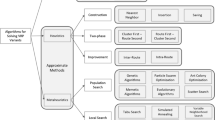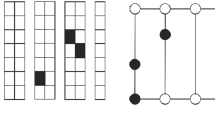Abstract
Today’s business environment is experiencing as a period of expansion and the globalization. Therefore, a distribution plan with low cost and high customer satisfaction in supply chain management (SCM) has been widely investigated. The purpose of this study is to establish optimal distribution planning in the supply chain. In this paper, a hybrid approach involving a genetic algorithm (GA) and simulation is presented to solve this problem. The GA is employed in order to quickly generate feasible distribution sequences. Considering uncertain factors such as queuing, breakdowns and repairing time in the supply chain, the simulation is used to minimize completion time for the distribution plan. The computational results for an example of a simple supply chain are given and discussed to validate the proposed approach. We obtained a more realistic distribution plan with optimal completion time by performing the iterative hybrid GA simulation procedure which reflects the stochastic nature of supply chains.
Similar content being viewed by others
References
Erengüç SS, Simpson NC, Vakharia AJ (1999) Integrated production/distribution planning in supply chains: an invited review. Eur J Oper Res 115:219–236
Beamon BM (1998) Supply chain design and analysis: models and methods. Int J Prod Econ 55:281–294
Benjamin J (1990) An analysis of mode choice for shippers in a constrained network with applications to just-in-time inventory. Transp Res B 24B/3:229–245
Williams JF (1983) Heuristic techniques for simultaneous scheduling of production and distribution in multi-echelon systems. Eur J Oper Res 29:77–92
Voudouris VT (1996) Mathematical programming techniques to debottleneck the supply chain of fine chemical industries. Comput Chem Eng 20:1269–1274
Yun YS, Gen M (2002) Advanced scheduling problem using constraint programming techniques in SCM environment. Comput Ind Eng 43:213–229
Zhou G, Min H, Gen M (2002) The balanced allocation of customers to multiple distribution centers in the supply chain network: a genetic algorithm approach. Comput Ind Eng 43:251–261
Ingalls RG (1998) The value of simulation in modelling supply chain. In: Proceedings of the 1998 Winter Simulation Conference, pp 1371–1375
Evans GN, Naim MM, Towill DR (1998) Application of a simulation methodology to the redesign of a logistical control system. Int J Prod Econ 56–57:157–168
Androttir S (1998) Handbook of simulation. Wiley, New York, pp 307–334
Fu M (2001) Simulation optimization. In: Proceedings of the 2001 Winter Simulation Conference, pp 53–61
Shanthikumar JG, Sargent RG (1983) A unifying view of hybrid simulation/analytic models and modeling. Oper Res 31:1030–1052
Hung YF, Leachman RC (1996) A production planning methodology for semi-conductor manufacturing based on iterative simulation and linear programming calculations. IEEE Trans Semicond Manuf 9(2):257–269
Lee YH, Cho MK, Kim SJ, Kim YB (2002) Supply chain simulation with discrete-continuous combined modeling. Comput Ind Eng 43:375–392
Lee YH, Kim SH (2002) Production-distribution planning in supply chain considering capacity constraints. Comput Ind Eng 43:169–190
Joines JA, Kupta D, Gokce MA, King RE, Kay MG (2002) Supply chain multi-objective simulation optimization. In: Proceedings of the 2002 Winter Simulation Conference, pp 1306–1314
Byrne MD, Bakir MA (1999) Production planning using a hybrid simulation-analytical approach. Int J Prod Econ 59:305–311
Kim B, Kim S (2001) Extended model of a hybrid production planning approach. Int J Prod Econ 73:165–173
Author information
Authors and Affiliations
Corresponding author
Rights and permissions
About this article
Cite this article
Lim, S., Jeong, S., Kim, K. et al. Hybrid approach to distribution planning reflecting a stochastic supply chain. Int J Adv Manuf Technol 28, 618–625 (2006). https://doi.org/10.1007/s00170-004-2398-7
Received:
Accepted:
Published:
Issue Date:
DOI: https://doi.org/10.1007/s00170-004-2398-7




